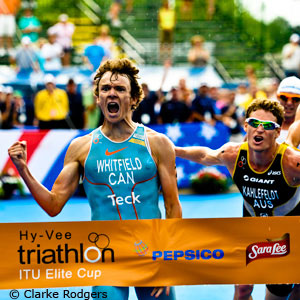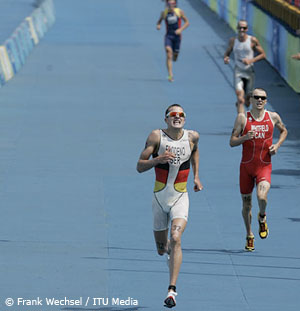Simon Whitfield is not running on empty
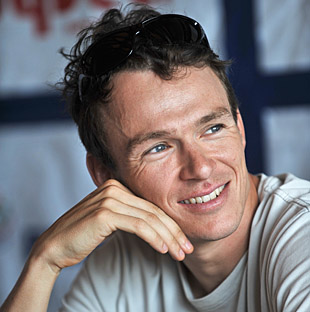
Simon Whitfield may be the closest thing Olympic distance triathlon has to an icon in the sport. Thankfully, in person he is more wit, elf and sprite than a ponderous stone monument. And with his lively thoughts and humor he lends as much to the sport with his words as by his deeds.
And what deeds they are! At age 25, the first Olympic men’s gold medalist with a longshot, 27th-after-the-bike-to-gold dash with a then-stunning 30:56 10k run. At age 33, an equally thrilling Olympic silver in the 2008 Beijing Olympic triathlon in a duel to the finish with Germany’s Jan Frodeno. A 2002 Commonwealth Games gold. One of the first Life Time Fitness Men’s gold medals and a $50,000 paycheck. 12 ITU World Cup victories, 21 World Cup podium finishes, and 7 top-10 finishes at the ITU World Championships he has never won. And a $200,000 win in the sport’s greatest 6-man duel to the finish at last year’s Hy-Vee Elite race.
This year on May 16, the forever young Whitfield turned 35 years of age. That’s ancient for tennis, cuttable for a star in the NFL, a youngster in golf, past prime as a sprinter, absolute prime for an Ironman. And just on the cusp of the end in Olympic distance triathlon – closer to the end than the beginning.
Some may suspect that Whitfield is past his prime, has lost his speed.
But not at all simple Simon says he would kick the butt of the kid who won Olympic gold in 2000 and is faster than ever.
When he's healthy.
Trouble so far is that after a 5th place at the opening round of the 2010 Dextro Energy World Championship Series in Sydney, Australia, Whitfield has had to pull out of two straight big races – the WCs round two in Seoul and at Hy-Vee with a malfunctioning hip flexor.
Slowtwitch: Where were you when Canada played the US in the gold medal hockey game?
Simon Whitfield: Where was I? Like everybody else I was glued to the television. I was at home for the first period, Then we went to a local bike shop. All the boys were sitting around and playing with this little pink bike that you ride around. So we were riding around and watching the hockey game. And we all died a thousand deaths.
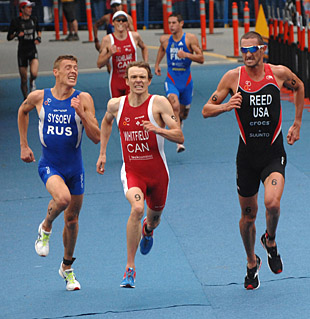
ST: Especially when the US scored a goal with 24 seconds to go to tie it up.
Simon: My goodness, how was that, eh? But then Canada won it. [Sidney] Crosby did it. So it was all good.
ST: Fate finally fell for him to win it, the already anointed Young King of Hockey. After a forgettable Olympics to that point, he needed it almost as much as the nation did.
Simon: He certainly did. Well ya know? What is he, 21? Now he has Olympic gold.
ST: Had your enchanting daughter Pippa reached the point where she knew to root for Canada?
Simon: No, no, no. She didn’t even wonder what was on television. It was annoying to her.
ST: She is involved in more important things?
Simon: Yes. Her sister and chasing around the bigger girls are the number one priority for her.
ST: Was it a good idea to skip Madrid and focus on Hy-Vee 2010?
Simon: I hated watching it. I wanted to go to Madrid actually. But it's too far for us. It is one thing for Jan [Frodeno] to race there near his home. But unless you are based in Europe, you could not come over here and then go back. We will be based there for Hamburg and London. I will live with Jan for 2-3 weeks.
ST:Two rivals, best buds?
Simon: I get to go to the bachelor life for a little while. I get to remember back in the day. Because he is young and lives alone! CHUCKLES
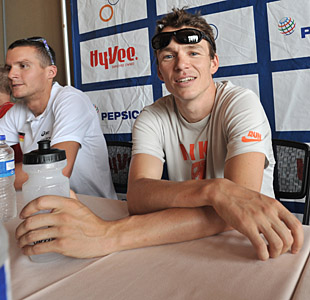
ST: How old are you now?
Simon: I am 35. I was 35 a month ago [May 16] .
ST: That is really not so close to losing your gifts, your speed is it?
Simon: Yes it is.
ST: What have you noticed has changed about your body, yourself and your speed at age 35?
Simon: No, it's not changed. It doesn’t seem that different yet. I would tell you the cliché ‘I don’t recover the same.’ But I do. I have a busier life. But it is rich and fulfilling and fun. I don’t know. I can honestly say I used to go the track and do a K in 2:30, 2:29. Maybe I can’t do that any more. But I can run 8 miles worth of intervals now. Maybe the composition of how I race has changed, the tactics.
ST: Bottom line?
Simon: But I am faster now than I ever was. I would kick the shit out of that little kid in 2000.
ST: The kid who ran 30:56 to win from behind in 2000 at Sydney?
Simon: Yeah, I would crush him. I would swim and ask him to stay on my wheel and I would outrun him. Unfortunately Brownlee would do the same. So that's the way the sport’s gone.
ST: Just because he is younger and we might assume that the human race is evolving in sport? How has Brownlee arrived at this exalted place at age 21? He hasn’t done as much work over as much time as you did in getting there.
Simon: Oh no I think he did the work.
ST: I mean the years you spent getting to that gold medal.
Simon: Yeah I mean he just has the perfect body type. And you know what is really telling? I am not saying this to take away from Courtney [Atkinson] and Sven [Riederer. Who finished second and third to Brownlee in Madrid]. But you watch the Madrid race. The scariest part of that race wasn't that Brownlee won. It is the fact that he crossed the finish line and fell over. Second place Courtney — great great great athlete. I know he is on a journey right now from injury and getting back to health. But he crossed the finish line standing up and smiling. And Sven was like rolling down doing the airplane thing. And I was like ‘Boys! First place just fell over. What are you doing?’
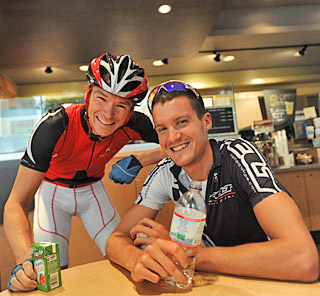
ST: Brownlee had a 10 second lead at the line. You could say he had it in the bag.
Simon: Oh yeah. He fell over. That is the scariest part of Brownlee.
ST: Is that like the NBA when the Lakers were ahead by 10 points in one playoff game but they were just killing it to the end, diving for balls?
Simon: Sort of. When Kobe does that weird thing with his teeth. I am going to win this game. I don’t care if Steve Nash is the greatest Canadian ever. I am just going to win this game! And he does! Brownlee has that look about him. And that is the scary part. Here he is. He has won every race he's been in since 2009.
ST: To me he looks professorial, diffident, a little bit like Harry Potter with the glasses. Where is the scary look you are talking about with Brownlee?
Simon: When he races.
ST: What does it look like?
Simon: You saw it. Just a driven crazy kid. I mean that in the nicest way. That is the scariest part about him. He is not complacent. And the fact that he is getting injured a little bit right now means that he is just pushing so hard and Javier is pushing so hard chasing him.
ST: What is the difference between pushing hard for greatness and stupidity?
Simon: Probably a very fine line. That is part of it. Taking that risk. You see it on every level. You see it on the young guys who are willing to put it out there that they want to do this and make the commitment and push for the limit.
ST: Do you see it in young kids in triathlon today?
Simon: I do. I train with a couple of those kids. We train this kid called Austin who on paper most people would say what chance does that guy have? But I dunno. He is a little bit nuts. He wants to train with us. He wants to keep up. Kyle Jones is the ultimate example of it. From 19 years old he trained with Greg Bennett and I. Lance would say you have 8 intervals to do and Greg and Simon are doing 10. And Kyle would sneak off and do two more.
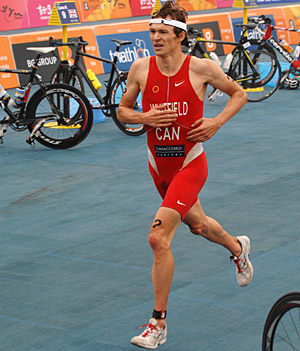
ST: Hy-Vee had a 5-man duel to the end last year. Does this change the way you approach it?
Simon: You have to evolve the way you train and race and how you approach the sport.
ST: Last year at Hy-Vee there were no strategic moves except to wait for the end until 500 meters to go. And then a million things happened. Will there be another level of moves this time around like chess masters figuring in the old games?
Simon: I have no idea. I think last year they hesitated because there were so many big guys right there. No one wanted to be the person that started and then got run over. That let me, who was running along in 7th, suddenly be in it. I would say that maybe we won’t make that mistake again to let someone back in. But it could be 35 degrees Celsius as it is today and in that sort of heat you cannot predict.
ST: Skip the money. How important was winning the duel with Jan Frodeno and the rest of the contenders in West Des Moines last year?
Simon: The most important thing was getting one back on Frodo. I mean that in the absolute most respectful sense. You could win this race 20 times. But he won the Olympics and he still has the last word. That is the ultimate prize – the Olympic gold. And he got it. When he joked he took the gold from me and I took the $200,000 from him, I said ‘Oh man. Want me to write you a check?’ So that is just the way it is.
ST: When do you look back with satisfaction at Hy-Vee 2009?
Simon: It is fun to have that poster of last year’s finish [at Hy-Vee]. We did a big charity event for kids in sport. And to be able to sign that picture right over the top of Frodo was kind of fun. CHUCKLES.
ST:What is your daughter Pippa to become?
Simon: Right now she is a performer. She is a singer and a performer. “Daddy sit down! Daddy I going to sing!” She is a performer. She is a monkey. She is a cute little thing. I dunno. She will be whatever she wants to be. If it is sport, that is terrific. We certainly won’t be pushing her towards sport.
ST: Is it a good idea for two top people in the sport to train together? Emma Snowsill and Emma Moffatt in 2009. You and Frodo at least for a while? You and Greg Bennett?
Simon: I don’t think the Emmas train together any more. Frodo and I will only be doing 2-3 weeks. But I love to do that.
ST: Can those Team of Rivals training partnerships go bad?
Simon: Of course. Eventually it goes bad in a lot of places. But Benno and I are still close. He is big brother to me. It created a bond that will never go away. Kyle [Jones] and I — Kyle was a quiet conservative kid when he first joined our group. I never thought we would have much in common. Now he is not just a kid any more. He is one of my best friends, one of my closest friends. If you had asked me that four years ago, I would have never said we would be close friends. I would have said we would be colleagues. Work mates.
ST: Is ITU racing more complex and moved beyond team tactics?
Simon: It is under wraps right now. Everybody is holding their cards close to their chest on how they do it. Because team tactics will be a factor at London in 2012.
ST: It worked for you in 2008?
Simon: Sure it worked for Beven [Docherty Olympic bronze medalist in 2008] too. It worked for any country that can and needs to employ it. If you have three great athletes like Great Britain, you play all three cards. You don’t play team racing. That is ridiculous. Let’s be frank, our funding here in Canada depends on winning medals, winning gold medals. And that is what drives us. That is why we made that decision. That is why Great Britain will make that decision. That is why NZL will make that decision. People love to cheer for that underdog and say that is not the way it was. I am like ‘Whatever. If you can’t figure out the puzzle, it’s not my fault.'


